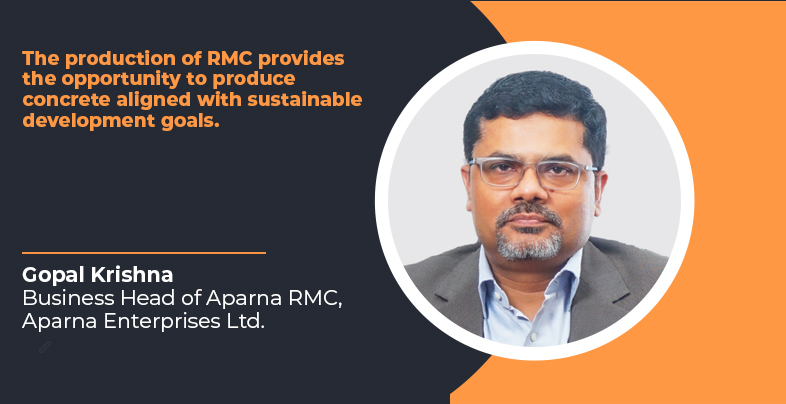Green technologies are reshaping RMC procurement trends
By Edit Team | October 7, 2023 6:29 pm SHARE

The production of RMC provides the opportunity to produce concrete aligned with sustainable development goals.
The construction industry’s transformation towards sustainability is reshaping RMC production, says Gopal Krishna, Business Head of Aparna RMC at Aparna Enterprise Ltd.
How do evolving construction practices and sustainability demands influence the technological innovation trajectory in RMC production?
RMC production has shifted towards material innovation, exploring eco-friendly alternatives like fly ash and slag to reduce carbon emissions and enhance performance. Mix design optimisation is vital for tailoring concrete mixes for specific projects, reducing waste, and improving quality. Moreover, digitalisation and automation transform RMC production, ensuring precise batching, quality control, and sustainability through real-time monitoring.
Energy efficiency is a top priority, with RMC producers adopting energy-saving technologies in cement production and mixing processes, reducing environmental impact. Investment in high-performance concrete mixes enhances durability, aligning with the trend for long-lasting infrastructure.
What’s your analysis of the link between urbanisation trends, RMC consumption, and their environmental and infrastructural impacts?
Urbanisation trends substantially impact ready-mix concrete (RMC) consumption and the environment. This relationship involves multiple interconnected factors. Rapid urbanisation increases energy consumption in residential areas, necessitating resource-efficient urban development strategies.
Changing customer preferences, such as shifting from slump concrete to flow concrete, reduces energy consumption, labour requirements, and noise levels during concrete placement.
Urbanisation alters the environment through resource consumption. RMC production contributes to environmental impacts like carbon emissions and waste generation. Adopting sustainable RMC production practices is crucial to mitigating these effects.
Factors like job opportunities, education, healthcare, and transportation networks influence the demand for affordable, high-quality housing in metropolitan areas. Varying housing affordability in different cities affects RMC demand.
What strategies are the RMC businesses adopting to optimise supply chains, mitigate resource constraints, and maintain construction quality?
The RMC industry is adopting strategies to optimise supply chains, ensure sustainability, and maintain construction quality. Sustainable production focuses on waste reduction and improved material utilisation, aligning with sustainability goals. Carbon capture technologies are also being explored to lower the carbon footprint. Supply chain management models customise operations, optimising efficiency. Automation and sensors enhance precision, quality control, and efficiency while reducing resource waste. RMC is cost-effective, speeding up construction and reducing labour costs. Minimising waste and improving material use further reduce costs for cement plants. These strategies together promote sustainability, efficiency, and affordability in the RMC industry.
How does the transition towards green and low-carbon technologies in RMC manufacturing impact the procurement pattern in India?
The procurement landscape for ready-mix concrete (RMC) in India is significantly transforming due to green and low-carbon technologies. Environmental sustainability and reduced carbon emissions are key factors influencing procurement decisions. Buyers are looking for RMC suppliers who can offer concrete mixes that comply with strict quality standards and align with green building practices and environmental regulations. Suppliers need to adopt innovative and sustainable manufacturing processes to meet these evolving procurement criteria, which can lead to long-term partnerships and responsible resource management. In this changing scenario, the procurement of RMC is no longer solely focused on cost considerations. Still, it is increasingly driven by a desire to contribute to India’s greener and more sustainable construction industry.
Spokesperson – Gopal Krishna, Business Head of Aparna RMC, Aparna Enterprises Ltd.
Cookie Consent
We use cookies to personalize your experience. By continuing to visit this website you agree to our Terms & Conditions, Privacy Policy and Cookie Policy.




































-20240213125207.png)

























